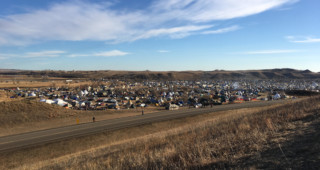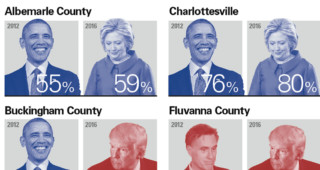Though Dominion Virginia Power announced last week the hiring of a contractor to build the Atlantic Coast Pipeline, efforts to halt its construction, and that of the Mountain Valley Pipeline, have not ceased.
A new survey released September 21 by two anti-pipeline groups, the Chesapeake Climate Action Network and Virginia Organizing, shows that 55 percent of Virginians do not back Governor Terry McAuliffe’s support of the two pipelines, despite his belief they will create jobs, lower bills and help the environment.
The Cromer Group, a public opinion research group, interviewed 732 of the state’s registered voters for the survey.
The environmental groups note that 60 percent of female Republicans and 52 percent of female Democrats say McAuliffe has missed the mark.
Caroline Bray, a 20-year-old third-year student at UVA and the president of the university’s Climate Action Society, falls on the far left of that spectrum, she says. But she’s not sure it matters in this case.

“One thing I’ve learned from traveling through the counties that the pipelines are supposed to cut across is that pipelines are not a partisan issue,” she says, adding that those bearing the brunt of the proposed pipelines live in rural, historically conservative areas. “They fight against them as hard as, if not more than, many liberals.”
A typical conservative pipeline opposer, she says, takes the stance that the proposed pipelines would infringe on their property rights, while liberals worry more about environmental concerns.
And one of those most recent concerns is the Federal Energy Regulatory Commission’s newly released Mountain Valley Pipeline environmental impact statement, which determines that any negative ecological effects associated with it are “limited.”
“Having crossed through the countryside that the Mountain Valley Pipeline is supposed to traverse,” Bray says, “I find it shocking.”
This spring, she hit the road with the Virginia Student Environmental Coalition to travel the MVP’s proposed path from Wetzel County, West Virginia, to Blacksburg, stopping along the way to speak with people who would be impacted by its presence.
“This land is unprecedented for a 42-inch pipeline,” she says. Much of the area’s mountainous topography has a karst landscape that is conducive to sinkholes and erosion, and West Virginia’s Monroe County has more than 100 natural water springs, she says. “If the rocks below these springs are shifted by the pipeline, the source of drinking water for an entire community and wildlife down the watershed could be permanently threatened.”
She also mentions a Monroe family she met that has lived on their property for more than eight generations, since before the Declaration of Independence was signed.
“Their land is sacred to them, and altering it with this pipeline is unjust in every way,” Bray says.
Also making headlines in the realm of Virginia pipelines has been McAuliffe’s insistence that governance over those entities is strictly a federal issue and the state has no authority.
“He seems both confused and forgetful,” says the Dominion Pipeline Monitoring Coalition’s Rick Webb, who notes that McAuliffe has said the state will grant the natural gas pipelines their water permits, which are required, under the Clean Water Act if the companies backing them meet the statutory requirements.
On McAuliffe’s September 22 visit to Charlottesville, he was greeted outside Democratic campaign headquarters on the Downtown Mall by a group of sign-waving pipeline protesters who demanded he take action.
He told a Newsplex reporter that he has no say in the matter, but he supports the group’s right to protest.
“This is democracy, this is what America is all about,” he said. “You’ve got 10, 15 folks protesting, but remember, I’m the governor of 8.5 million people.”
In other news, the results of a study commissioned by the Southern Environmental Law Center and Appalachian Mountain Advocates released September 12 say the anticipated natural gas supply will meet the maximum demand from next year until 2030 without building a new pipeline.
“It’s an issue of competitive advantage rather than public need,” Webb says. “It’s mostly about Dominion seeking to displace Williams Transco as the major natural gas supply for the Southeast, while passing the cost of doing so along to its captive ratepayers.”
Dominion spokesperson Aaron Ruby says the report is full of flawed assumptions and misleading data.
“It’s an anti-pipeline report paid for by anti-pipeline groups, so it shouldn’t surprise anyone what it says,” he says. “The fact is, demand for natural gas in Virginia and North Carolina is growing significantly.”
Demand will grow by 165 percent over the next 20 years, he says, because coal is being replaced with cleaner-burning natural gas. And not only are new industries increasingly relying on natural gas, but the population itself is growing.
“There is no way existing pipelines or gas storage can meet that huge growth in demand,” Ruby says. “Existing pipelines in the region are constrained and operating at full capacity. Even planned expansions of those pipelines are fully subscribed.”
In Hampton Roads, he says pipelines are so constrained that the natural gas service is “curtailed” for large industrial customers during high-demand periods in the winter. In North Carolina, he adds, one pipeline serves the entire state, and because it’s located in the western half, entire communities in eastern North Carolina have limited to no access to the supply.
“The region’s existing pipelines cannot address these challenges,” says Ruby. “New infrastructure is required. That’s why we’re proposing to build the Atlantic Coast Pipeline.”






















